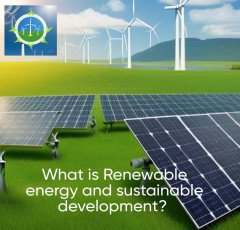
What is Renewable energy and sustainable development ?

Energy sources that can produce sustainable energy supplies and are naturally renewed are referred to as renewable energy sources. Solar, wind, hydro, geothermal, and biomass are some examples.
Contrarily, sustainable development refers to growth that satisfies existing needs without endangering the ability of future generations to satisfy their own. This encompasses social, political, and environmental factors.
Because it offers a cleaner and more sustainable alternative to fossil fuels, which are a contributing factor to climate change and environmental deterioration, renewable energy is a crucial component of sustainable development. We can lessen greenhouse gas emissions and lessen the effects of climate change while simultaneously generating economic possibilities and enhancing societal well-being by developing and utilizing renewable energy sources.
Because it offers a cleaner and more sustainable alternative to fossil fuels, which are a contributing factor to climate change and environmental deterioration, renewable energy is a crucial component of sustainable development. We can lessen greenhouse gas emissions and lessen the effects of climate change while simultaneously generating economic possibilities and enhancing societal well-being by developing and utilizing renewable energy sources.
In general, sustainable development and renewable energy are intertwined and essential for securing a future for our planet and its inhabitants.
By lowering our reliance on non-renewable energy sources like oil, coal, and gas, renewable energy has the potential to revolutionize the energy industry. We can increase energy security and lessen the risk of price changes and supply interruptions linked to non-renewable sources of energy by increasing the proportion of renewable energy in our energy mix.
Economic growth can benefit from the use of renewable energy. We can bolster economic growth, draw in investments, and generate jobs by encouraging the rise of renewable energy industries. Furthermore, access to affordable and dependable energy services can be made possible by renewable energy, especially in rural and distant places where access to electricity is restricted.
To achieve sustainable development through the use of renewable energy, however, we must make sure that the creation and application of renewable energy technologies are both environmentally and socially responsible. This necessitates considering the potential effects of renewable energy projects on regional ecosystems, biodiversity, and local communities. Additionally, it calls for ensuring that the advantages of renewable energy are fairly spread across society and that marginalized and vulnerable populations are not left behind.
The development and use of renewable energy technologies are essential for attaining sustainable development because they are intimately linked to renewable energy.
We can build a more prosperous, just, and sustainable future for ourselves and for future generations by supporting renewable energy and sustainable development.
It is crucial to have a comprehensive strategy that takes into account the economic, social, and environmental aspects of sustainable development if one is to accomplish sustainable development with renewable energy. In order to achieve this, it is necessary to promote cross-sector coordination and collaboration as well as the integration of renewable energy into larger energy and development policies.
The need to invest in research, development, and innovation to increase the efficiency, dependability, and affordability of renewable energy technology is another crucial component of sustainable development through renewable energy. As a result, the deployment of renewable energy sources may be sped up and may become a more attractive substitute for non-renewable energy sources.
Furthermore, in order to achieve sustainable development with renewable energy, laws and policies must be put in place that encourage the creation and use of new renewable energy technologies as well as their integration into the larger energy system. This covers policies such as feed-in tariffs, carbon pricing, renewable energy objectives, and energy efficiency requirements.
In order to encourage the adoption of renewable energy technology and practices and to increase public support for sustainable development more generally, sustainable development through renewable energy involves education, awareness-raising, and capacity-building efforts.
For our planet and its inhabitants to have a sustainable future, renewable energy and sustainable development are essential.
We can encourage the creation and use of renewable energy technologies and create a more prosperous, just, and sustainable future for present and future generations by taking a holistic and integrated approach that takes into account the economic, social, and environmental dimensions of sustainable development.
Renewable energy has a variety of advantages that promote sustainable development.
For instance, renewable energy technologies can lower air pollution and greenhouse gas emissions, both of which have a negative influence on the environment and human health. We can lessen the effects of climate change, enhance air quality, and save ecosystems and biodiversity by reducing these emissions.
By lowering our reliance on non-renewable energy sources, which frequently experience price swings, supply interruptions, and geopolitical threats, renewable energy can also increase energy security. We can build a more reliable and shock-resistant energy system by incorporating more renewable energy into our energy mix.
Renewable energy can open up new business opportunities and encourage the creation of jobs, especially in rural and remote places where there are a lot of renewable energy resources available. Additionally, the use of renewable energy can attract investments, strengthen regional economies, and foster the advancement of technology.
Furthermore, access to affordable and dependable energy services can be made possible by renewable energy, particularly in emerging nations where energy poverty is pervasive. Access to energy can enhance social well-being, lessen poverty, and generally encourage sustainable development.
Overall, tackling some of the most critical issues confronting our planet, such as climate change, environmental degradation, and energy poverty, requires the use of renewable energy and sustainable development. We can build a more just, wealthy, and long-lasting future for everyone by encouraging renewable energy and sustainable development.
Sustainable development and renewable energy both present certain difficulties, though.
In order to be integrated into the larger energy system, renewable energy sources, for instance, may need changes to the grid and infrastructure. This can be difficult, especially for developing nations with few resources.
Furthermore, the social and environmental effects of renewable energy projects need to be properly regulated.
Large-scale hydropower projects, for instance, may result in the eviction of local residents and have an effect on ecosystems and biodiversity. Similar effects can be expected from wind and solar installations, especially if they are not properly sited.
Additionally, the erratic nature of renewable energy sources can make maintaining a stable, reliable grid difficult.
This necessitates the creation of energy storage technologies and smart grid systems that are better able to control the fluctuation of renewable energy sources and provide a steady and dependable electricity supply.
Last but not least, the adoption of renewable energy technology must be complemented by laws and policies that encourage sustainable growth and guarantee that the advantages of renewable energy are equally dispersed across society. This calls for a thorough and well-rounded strategy that considers sustainable development's social, economic, and environmental facets.
A more just, wealthy, and sustainable future depends on renewable energy and sustainable development.
Although renewable energy and sustainable development face some difficulties, these difficulties can be overcome by creative policies, technologies, and practices that advance sustainable development more generally.
Adopting a thorough and integrated strategy that considers the economic, social, and environmental aspects of sustainable development is crucial to overcoming the difficulties posed by renewable energy and sustainable development. Governments, the commercial sector, civil society, and international organizations all need to work together on this.
The need to create and implement laws and regulations that encourage sustainable growth and the adoption of renewable energy technology is a crucial component of this strategy. This includes actions like energy efficiency regulations, feed-in tariffs, carbon pricing, and renewable energy targets.
The requirement to invest in R&D and innovation to raise the effectiveness, dependability, and affordability of renewable energy technology is another crucial component of this strategy. As a result, the deployment of renewable energy sources may be sped up and may become a more attractive substitute for non-renewable energy sources.
Additionally, in order to encourage the adoption of renewable energy technology and practices as well as to increase public support for sustainable development in general, sustainable development through renewable energy calls for education, awareness-raising, and capacity-building initiatives.
In order to integrate renewable energy into the larger energy system, infrastructure development and grid improvements are also necessary for sustainable development using renewable energy. To better control the fluctuation of renewable energy sources and provide a steady and dependable energy supply, this can entail the development of energy storage technologies and smart grid systems.
The management of potential effects of renewable energy projects on nearby populations, ecosystems, and biodiversity is necessary in order to achieve sustainable development through renewable energy. Engagement with local people, stakeholders, and civil society is necessary for this, as is the creation of reliable frameworks for evaluating the environmental and social impacts.
As a result, attaining sustainable development with renewable energy necessitates a thorough and well-rounded strategy that considers the economic, social, and environmental aspects of sustainable development. Such an approach will enable us to build a more just, prosperous, and sustainable future for present and future generations.
Prioritizing the development of renewable energy sources that are suitable for the local context and have the potential to provide sustainable benefits to local communities is crucial for achieving sustainable development through renewable energy.
The use of wind or solar energy, for instance, may be the best renewable energy option in areas with a wealth of wind or solar resources.
Hydropower might be a good choice in places with plenty of available water resources. Decentralized and off-grid renewable energy systems may also be a suitable option for isolated or rural areas lacking grid access.
Furthermore, energy efficiency and conservation must be prioritized in order to achieve sustainable development using renewable energy. We may lessen the need for energy and lessen the negative effects of energy production on the environment and society by using energy-efficient buildings, appliances, and transportation systems.
The need to ensuring that the advantages of renewable energy are equally distributed across society is another crucial component of sustainable development through renewable energy. This necessitates an emphasis on social equality and the participation of vulnerable and marginalized people in the planning and decision-making processes for renewable energy.
The circular economy and resource sustainability must also be emphasized for sustainable development using renewable energy.
This entails the creation of techniques and methods that make it possible to recycle, reuse, and repurpose the components and materials used in the production and use of renewable energy sources, as well as the reduction of waste and pollution generated during these processes.
Last but not least, an emphasis on global collaboration and cooperation is necessary for sustainable growth through renewable energy.
In addition to providing financial and technical support to assist developing countries in increasing their capacity for renewable energy, this also includes the transfer of renewable energy technologies and information to such nations.
Attaining sustainable development with renewable energy necessitates a comprehensive and integrated strategy that considers the environmental, social, and economic facets of sustainable development. We can build a more just, wealthy, and sustainable future for ourselves and for future generations by using this strategy.
In order to achieve sustainable development through renewable energy, it is also critical to address the problem of energy poverty, which affects millions of people worldwide and is especially severe in developing nations. Lack of affordable, dependable, and contemporary energy services is referred to as energy poverty, and it can have a serious impact on one's health, education, and employment chances.
By enabling access to safe, dependable, and reasonably priced energy services, renewable energy can play a significant role in combating energy poverty.
Off-grid renewable energy systems, such as solar home systems, mini-grids, and community-based renewable energy initiatives, can be used to provide electricity to homes, schools, and healthcare facilities in rural or underserved areas.
By lowering greenhouse gas emissions and boosting community resilience to climate change impacts, renewable energy can support efforts to both mitigate and adapt to climate change.
Prioritizing policies and investments that encourage the use of renewable energy sources and more generally support sustainable development is crucial for achieving these objectives. This covers actions like quotas for renewable energy, feed-in rates, carbon pricing, energy efficiency requirements, and public-private partnerships.
For developing nations that might not have the resources and capacity to independently deploy renewable energy technology, international cooperation and collaboration are crucial for attaining sustainable development through renewable energy. This includes transferring knowledge and technologies related to renewable energy, as well as financial and technical information.
In order to achieve a more just, prosperous, and sustainable future for all, it is essential to combine renewable energy and sustainable development.
We can address some of the world's most important issues, such as energy poverty, climate change, and social and environmental injustice, by giving sustainable development through renewable energy top priority.
The significance of stakeholder engagement and participation in attaining sustainable development through renewable energy is another crucial factor. This entails involving all pertinent parties, such as local communities, civil society groups, and other significant players in the planning and decision-making processes for renewable energy.
Making sure that renewable energy projects reflect the needs and goals of the communities they serve and are socially and environmentally sustainable is crucial. Renewable energy projects can produce social, economic, and environmental advantages that are fair and inclusive by incorporating local people and other stakeholders.
Stakeholder involvement can also aid in fostering accountability and openness in the field of renewable energy.
In order to guarantee that renewable energy projects are built in a manner that is respectful of regional cultures and traditions and that promotes social and environmental justice, this can include processes like public consultations, grievance systems, and community engagement plans.
The need to encourage innovation and technology development in the renewable energy sector is another crucial component of attaining sustainable development through renewable energy. This encompasses the creation of new, more effective, cost-effective, and dependable renewable energy technology and solutions as well as the creative and novel use of already existing renewable energy technologies.
The creation of new jobs and economic expansion in the renewable energy sector can be facilitated by innovation and technological advancement, which can also assist in removing some of the obstacles to the deployment of renewable energy sources, such as high costs and unpredictability.
Using renewable energy to achieve sustainable development calls for a long-term, strategic strategy that takes into consideration the changing demands and objectives of society and the environment. This calls for ongoing evaluation of renewable energy projects and their effects, as well as adaptation and adjustment of investments and regulations in the field as needed to keep them relevant and effective.
Achieving sustainable development with renewable energy necessitates a thorough and well-rounded strategy that considers the social, economic, and environmental aspects of sustainable development. A more egalitarian, affluent, and sustainable future can be built for both present and future generations by using this strategy.
In conclusion, the ideas of renewable energy and sustainable development are linked.
Through the provision of clean, dependable, and affordable energy services, economic growth and job creation, the eradication of energy poverty, the mitigation of climate change, and the improvement of social and environmental sustainability, renewable energy can be a key component of achieving sustainable development.
Sustainable development through the use of renewable energy calls for a thorough and well-rounded strategy that considers the social, economic, and environmental facets of sustainable development as well as the necessity for stakeholder involvement, innovation, and long-term strategic planning.
We can build a more just, wealthy, and sustainable future for everybody if we prioritize sustainable development through renewable energy.
In order to support and promote sustainable development and renewable energy, as well as to make sure that these objectives are accomplished in an equitable and inclusive manner, it is up to individuals, communities, governments, and international organizations to collaborate.
It takes a team effort from all stakeholders, including governments, international organizations, civil society, the commercial sector, and individuals, to achieve sustainable development through renewable energy. Governments can significantly contribute to the promotion of renewable energy and sustainable development by creating and enforcing laws and regulations that facilitate the deployment of renewable energy, such as renewable energy targets, feed-in tariffs, tax breaks, and energy efficiency standards.
International organizations can also help developing nations implement renewable energy technology and advance sustainable development by offering them financial and technical support.
Through advocacy, funding, and innovation efforts, civil society organizations and the commercial sector can also contribute significantly to the promotion of sustainable development using renewable energy.
By implementing energy-efficient habits and supporting renewable energy technology in their homes and communities, individuals may also help to promote sustainable development through renewable energy.
Furthermore, fostering sustainable development through renewable energy necessitates resolving the difficulties and hindrances that may prevent the deployment of renewable energy, such as high initial prices, a lack of funding options, and regulatory restrictions. This calls for a multifaceted strategy that incorporates information sharing, creating capacity, and transfer.
Promoting sustainable development via renewable energy necessitates taking into account the social and environmental implications of renewable energy projects and making sure that these projects are built in a way that is inclusive, egalitarian, and respectful of local communities and the environment.
Renewable energy requires a holistic and integrated approach that considers the various facets of sustainable development and involves all stakeholders in the planning and decision-making processes. This is necessary to achieve sustainable development with renewable energy. We can build a more wealthy, just, and long-lasting future for ourselves and for future generations by cooperating to advance renewable energy and sustainable development.
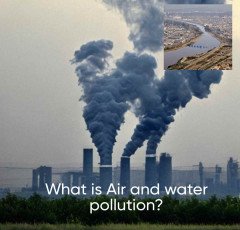



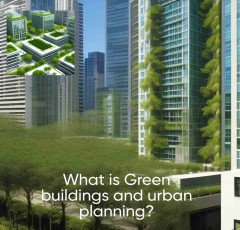
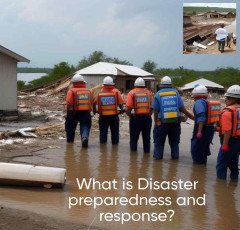

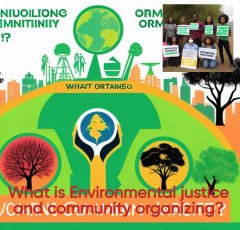


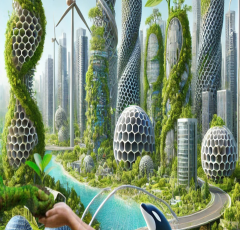







 TitTok Revolution
TitTok Revolution  Online Marketing
Online Marketing  Only For The United States
Only For The United States  Men Clothing
Men Clothing  The Click Engine
The Click Engine  Hot Bags For Pain Relief
Hot Bags For Pain Relief  Unlimited access to classes on illustration, photography, design, film, music
Unlimited access to classes on illustration, photography, design, film, music  ASUS Laptop
ASUS Laptop  NordPass
NordPass  Smart Doorbell
Smart Doorbell  1150+Trendy kids coloring pages Bundle
1150+Trendy kids coloring pages Bundle  Unreal Engine 5 For Beginners Learn The Basics Of Virtual Production
Unreal Engine 5 For Beginners Learn The Basics Of Virtual Production  SOFAS
SOFAS  Best Robotic Vacuum Cleaners
Best Robotic Vacuum Cleaners  Hello Theme
Hello Theme  ELECTRONIC ACCESSORIES
ELECTRONIC ACCESSORIES  Sennheiser
Sennheiser  NordVPN
NordVPN  One World Collection
One World Collection  All Wireless Products
All Wireless Products  Amazon Best Selling Products
Amazon Best Selling Products  Acer Laptop
Acer Laptop  Creative Brief For Video Shoot
Creative Brief For Video Shoot  Graphics & Design
Graphics & Design  SEO Checklist
SEO Checklist  Best Home Appliances
Best Home Appliances  Women Fashion
Women Fashion  Online Technology Classes
Online Technology Classes  Best Sellers On Amazon
Best Sellers On Amazon  Favorite Company (Cuelinks)
Favorite Company (Cuelinks)  The Secret Email System
The Secret Email System  RPM 3.0
RPM 3.0  Top Rated From Amazon
Top Rated From Amazon  Artificial Intelligence
Artificial Intelligence  NordLocker
NordLocker  BEST SELLER TOP10
BEST SELLER TOP10  ASPINAL LONDON
ASPINAL LONDON  Best Selling Books
Best Selling Books 
















